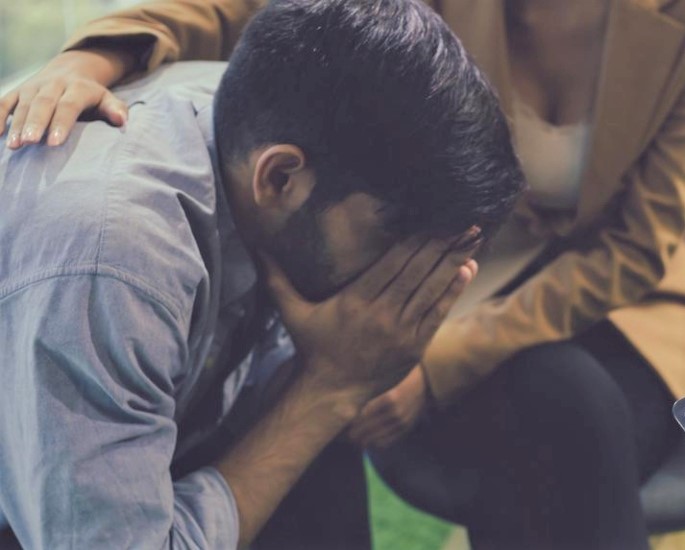"She told me she was hurting and I ran away"
Mental health is impossible to ignore. The symptoms of tiredness, frustration, agitation and more are mentally draining.
It affects mood and in severe cases makes you unable to carry out day-to-day activities. It makes you vulnerable and sensitive to yourself and others.
Mental health and relationships are very interlinked. In some cases, relationships even cause mental distress.
Other times, external factors like upbringing, careers, social life and failure can lead to mental health problems.
However, whilst mental health is more acknowledged in Desi communities, discussing it with romantic partners is still daunting.
Although, disclosure of mental health issues is necessary for a healthy romantic relationship.
Many partners and spouses are able to provide a safe space and are willing to put in the extra bit of work to be the supporting and caring person their significant other requires.
But, this is not always the case. Not everyone is willing to shoulder the added responsibility of looking after another’s mental health.
Mind, the mental health organisation, shares that three in five people say their mental health was the cause of past break-ups.
The survey that looked at 1000 people and their relationships also found that 60% of people said being in a relationship had a healthy impact on their mental health.
But, it’s important to clarify if this is also representative of South Asian marriages.
Mental Health and Desi Marriages
At DESIblitz, we wanted to understand if mental health was truly damaging to Desi marriages, love and sex. To do this, we spoke to several people.
Due to the sensitivity of this topic, not everyone was willing to share intimate details but highlights the strain mental health can have.
Sonia Mahmood* has been married for 12 years and shares her experiences with mental health and how her husband supported her:
“At the time, I didn’t even know that I was going through a mental health crisis. I’d lash out at my husband over unnecessary things.
“I didn’t realise that I was bringing home my baggage from work. Back then, I couldn’t understand why I was feeling the way I was.
“I was picking fights over little things with my husband. One day he just had enough of my nonsense and sat me down to speak. I think I needed that. I cried for hours that day.”
It is important to be firm when necessary. A lot of the time, people find it difficult to seek help as they don’t want it to be burdensome. Sonia continues:
“My job was horrible. I was the only female in my corporate office job and often felt singled out and left out. They’d purposely ignore me and make me feel invalidated.
“I didn’t want to quit because life was expensive, but my husband explained that a job shouldn’t cost me my mental health.
“He was a supportive and loving husband. That’s what got me through it all.”
As adults, you are confined to work life, and this can be mentally draining. Especially when colleagues add to the issue and you feel there is nobody to turn to.
In times of crisis, a supportive figure can do a world of good.
Moreover, we looked at the stigma surrounding men’s mental health as Fahim Sheikh*, who has been married for three years, reveals:
“I knew I was going through mental strain before I got married.
“But as a man, you’re not taught to delve into your emotions and assess things.”
“I didn’t feel like I could share that I was this close to just – I don’t know. I felt overwhelmed all the time and I don’t know what’s making me feel this way.”
The stigma surrounding men’s mental health can make it extremely difficult for them to open up to their spouses.
The idea of masculinity is instilled in the Desi community and the deterioration of a man’s mental health is often seen as a weakness.
This prevents many men from being open and honest about their feelings.
When it comes to physical pain, the Desi community is always there to help out. However, the term mental health echoes the word ‘mental’ in it.
There’s always been a longstanding issue dating back hundreds of years where deteriorating mental health is often equated to going ‘crazy’.
This ideology perpetuates a culture where individuals, especially men, hide their mental struggles. Thus, seeking help becomes a difficult step. Fahim goes on to say:
“It’s just hard. I haven’t been the best version of myself in this marriage. My wife says she’s married two people. One is nice and caring, the other is distant and absent.
“Making her feel this way when it’s not her fault makes me feel guilty.
“But how do I say to my wife that I’m emotionally unavailable? That I can’t look after your emotional needs because f**k knows what’s happening with my own? I feel like I’ve failed both of us.”
Fahim has not communicated his mental health to his wife. But the problems he is facing are certainly being observed by his wife.
Tackling mental health and marriage is difficult.
Guilt becomes a regular emotion as people often feel like they are letting down their spouse even if they don’t want to. They feel trapped and are unable to seek help.
In most cases, it’s not that they don’t want help but cannot find it in themselves to look for solutions.
Whilst it’s in the best interest of the person going through internal struggles to talk when they feel ready, prolonging that discussion can have adverse effects.
For example, Amin Bhattarjee* who has not been married for long shares:
“I had an arranged marriage and my husband failed to mention that he’s been depressed for the last couple of years.
“And I feel betrayed, I feel like this isn’t something to hide. I don’t know how to deal with him or be present, I didn’t sign up for this.
“I feel like a horrible person because I’m not being a supportive wife, but I can’t help but feel this way.”
“It’s emotionally draining to be around him. He projects his depression and view of the world onto me. I feel suffocated.”
Disclosure of both mental and physical well-being is necessary for a relationship to be healthy.
Amin wasn’t given a choice to consider whether she would be okay to marry someone with depression.
This discussion certainly raises important questions. Why are people often villainised for refusing to be a helping hand?
If they feel incapable or do not have the capacity to be that kind of support, then that is their choice, as Amin concludes:
“Had I known before marriage, I definitely wouldn’t have accepted his Rishta.”
With that said, it is crucial to understand that it isn’t your spouse’s responsibility to heal your mental health. What is important is having the ability to choose.
But, what if both people in the relationship have mental health problems? How would that affect a Desi marriage? We spoke to Rashmika Mahn* who’s been married for 11 years:
“I try not to be comical when it comes to mental health. It’s a very serious topic.
“But every time I explain that my husband and I are both depressed, it just sounds funny.
“Two mentally unstable people healing each other and sometimes being the most toxic together. That’s our marriage to sum it up.
“We’ve gone to therapy individually and that helps but it’s so expensive. I’d rather be depressed than broke.”
In Rashmika’s marriage, there is an openness about their mental health state as a couple. This allows them to be supportive of each other as they are going through similar experiences.
But it can also mean that they can often trigger one another, but something they’ve come to terms with.
It seems that mental health can have varying effects on different marriages and their state of them.
Whilst the supportive nature is consistent, there are cases where a person can’t offer as much aid as they’d like to because of the emotional strain.
Mental Health and Love
What about when it comes to South Asian people and finding love? Does mental health still play a massive part in how individuals see a potential suitor?
Paulvi Mehra*, a woman who just broke off a five-year relationship declares:
“It’s just very hard. I love him but I know my feelings and hurt is affecting us. I don’t think I have the mental capacity to sustain this relationship.
“We have so much history and time behind us. For me, it was never about falling out of love. It was just about healing.
“I need to heal so I can be the best version of me if we get back together. For as long as I can remember, I’ve been dumping traumas on him and I can see it drains him.
“I don’t want him to resent me in the end. I just need to heal for myself and for us.”
When one enters a relationship with unresolved mental health issues it can become difficult to balance the relationship.
As Paulvi said, healing is crucial to rediscovering and loving yourself. Once this is done, it is easier to be in a relationship.
We also spoke to Aisha Mehmood* who is single and diagnosed with depression:
“I grew up in a very toxic household. My parents would fight all the time.
“They didn’t set the best example of love. But I do want it. I want to fall in love and experience all those fairytale things.
“And it scares me to think I’ll just scare him, or I’ll be too much – I don’t want to be the girl that’s unlovable.
“I know I bring a lot of negativities to the table, but I really can’t help it. I want to love but I’m so terrified of living my parents’ life.”
Growing up traumatised can not only make you insecure but also make you crave a love that you’ve never experienced.
There is also the fear of being disappointed. What if love truly is found but it only further traumatises you?
Faizan Khan* has been dating for six years and reveals his feelings toward being supportive at the risk of your own wellbeing:
“It wasn’t always so bad. We met at school and since then it’s been a very long time.
“Her mental health isn’t as bad as some other people I know. But I know she’s going through things.
“I try to be supportive, so it doesn’t get worse but sometimes I feel stuck.
“Nothing I do is ever enough and some days it’s exhausting. But you don’t give up on love.”
Having a supportive environment is important for the well-being of someone’s mental health. For Faizan, there are difficult days, and he is willing to persevere in order for his partner to feel better.
But there are regrets from some South Asian people when being with someone who has mental health problems. Hanif Ali*, who is single adds:
“Back in the days, I started seeing a girl and at some point, she disclosed she had some sort of anxiety disorder. I just dipped.
“I really fancied her, but I just couldn’t do it. It really threw me off. I wasn’t ready to be someone’s mental support.
“Looking back, I regret it. She told me she was hurting and I ran away.”
Being there for someone and committing to being someone’s support system is very difficult. Refusing to be that person can make one feel extremely guilty
But it is important to remember to only provide support if you are able to.
It takes a lot of discipline to know if you cannot be there for someone, but more resources should be available for Desi people involved in these types of instances.
Mental Health and Sex
Mental health issues don’t just affect marriages and relationships. They also have an impact on the sexual life of South Asians as well.
Sex is a massive part of marriage for many Desis so how does it change when mental health is involved? Husnain Baig*, who’s been married for seven years says:
“It’s definitely taken a hit up on my sex life. I just don’t want to all the time, I feel exhausted.
“I haven’t told my wife that I got depression. It feels embarrassing. She thinks I’m no longer attracted to her and there are constant fights about it.
“I don’t feel like having sex as I used to before.
“It’s not that we’re not doing it. But she’s noticed something’s off, and she thinks it’s her.”
Husnain’s inability to open up to his wife about his mental health is affecting his sex life. It is also building insecurity in his wife as she feels undesirable.
In contrast, Sid Patel* who’s been with his partner for eight years shares:
“We’re a very affectionate couple. Physical touch is our love language.
“I didn’t notice her low libido straight away, it took a bit of time. Every time I’d initiate sex, she wasn’t very into it.
“I thought she no longer desired me. I put on a bit of weight over the summer but that’s never been a problem in the past.
“It just made me insecure. She used to be very touchy-feely, so I really felt its absence.”
“Now obviously she’s told me, and it all makes sense. I’m just going to be there for her. Sex is important to me. But it’s not the end of the world.”
Communicating feelings can bring a lot of clarity for the couple involved. It clears the air and also creates a supportive and reliable space.
Faiza Bibi*, married for over two years, has similar feelings:
“My mental health has never affected our sex life. I don’t think at least. It has certainly affected everything else.
“I used to get mad at my husband and upset over little things. But sex has been one thing that’s stayed the same.
“It always puts me in a good mood.”
Faiza raises an interesting point.
Mental health issues can create distance between partners but due to the intimacy that sex involves, it can actually be used to build upon that loving connection and rekindle emotions.
Aniqa Pawar*, who’s been dating for three years reveals some similar emotions:
“I don’t think there’s necessarily been a big difference in our sex life, but I guess we don’t have sex as frequently as we used to.
“I don’t know if it’s because we’re both so depressed or just busy, I couldn’t quite say but there’s defo a difference.”
With so much happening in life, it is difficult to pinpoint why there’s a difference in your sex life.
Discussing mental health can sometimes be very triggering. It is important to notice signs and seek help when possible.
It’s very interesting to see how the different areas of romance and relationships are affected by mental health.
Some couples deal with it as best they can, while others feel burdened by their partner’s conflicts.
Being there for loved ones is a responsible and honourable thing to do. However, it is equally important to remember that looking after one’s own mental health is as important.
But this all points back to having more open and honest discussions within the South Asian culture.
This will in turn remove any lingering stigmas and promote more knowledge surrounding mental health.
For those struggling, there are some great resources available that will support you or your loved needs. Here are some that may be helpful:
































































